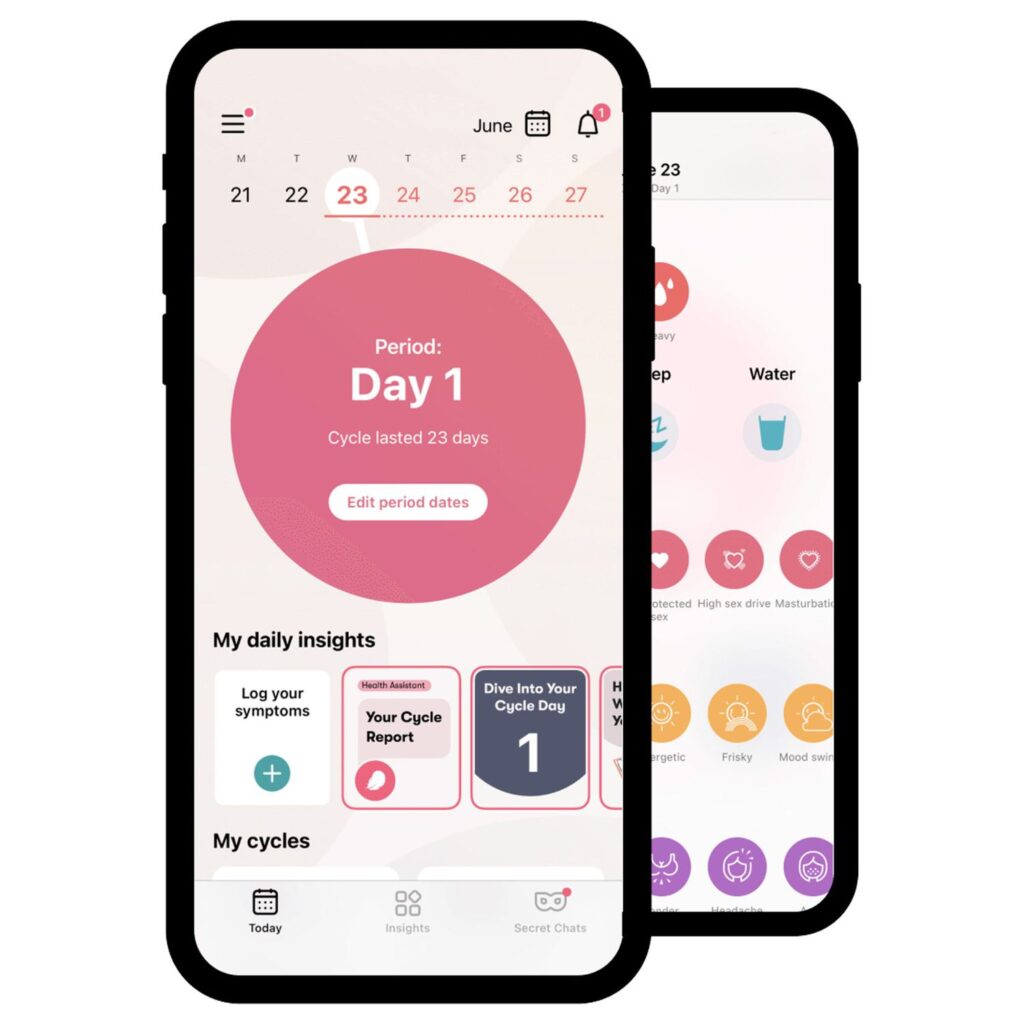Mental and Emotional Health support

Source: Flo health
We know it can be hard to explain but we’re here to support and help you
Polycystic ovary syndrome (PCOS) is a multifaceted condition that influences various facets of an individual’s well-being, extending to mental health. Individuals with PCOS are more prone to reporting heightened symptoms of anxiety and depression, and these symptoms tend to be more severe.
Individuals diagnosed with PCOS face a threefold increased likelihood of encountering depression and anxiety compared to those without the condition. The underlying reasons for this heightened risk remain uncertain. The majority of studies investigating the connection between PCOS and mental health have concentrated on depression and anxiety. However, there is evidence suggesting a potential link between PCOS and a higher likelihood of experiencing obsessive-compulsive disorder (OCD), bipolar disorder, and eating disorders.
Exploring various treatments, including medications and other therapeutic approaches, may prove beneficial in alleviating symptoms associated with depression and anxiety in individuals with PCOS.
PCOS can cause symptoms like infertility and hirsutism (excess facial and body hair). Some people with PCOS report feeling frustrated and anxious about their ability to become pregnant, their weight, excess body and facial hair, or lack of control over their health and bodies.
A person’s values and the culture they live in will impact which characteristics they may find distressing. These same characteristics can also impact the emotional well-being of people without PCOS. People with PCOS still have an increased risk for depression and anxiety regardless of their weight, age, socioeconomic factors, facial and body hair, and fertility.
Many women experience physical or mood alterations in the days leading up to menstruation. When these symptoms persist from month to month and significantly disrupt a woman’s regular life, it is referred to as premenstrual syndrome (PMS).
Emotional symptoms include:
- depression
- angry outbursts
- irritability
- crying spells
- anxiety
- confusion
- social withdrawal
- poor concentration
- insomnia
- increased nap taking
- changes in sexual desire
Physical symptoms include:
- thirst and appetite changes (food cravings)
- breast tenderness
- bloating and weight gain
- headache
- swelling of the hands or feet
- aches and pains
- fatigue
- skin problems
- gastrointestinal symptoms
- abdominal pain
In addition to depression and anxiety, symptoms of various disorders may intensify in the days preceding your period, including seizure disorders, migraines, asthma, and allergies.
For mild to moderate symptoms, lifestyle or dietary adjustments can often provide relief. If PMS symptoms significantly disrupt your life, seeking medical treatment may be a viable option. The recommended treatment will be contingent on the severity of your symptoms, with medication being a potential suggestion in more severe cases as advised by your ob-gyn.
To alleviate PMS symptoms, incorporating relaxation techniques and stress reduction is beneficial. Your ob-gyn may propose relaxation therapy, encompassing activities like breathing exercises, meditation, and yoga. Massage therapy is another form of relaxation therapy to consider. Some women find biofeedback and self-hypnosis helpful in managing PMS symptoms. Ensuring adequate sleep is crucial. Consistent sleep patterns, where you wake up and go to sleep at the same times daily, even on weekends, can potentially mitigate mood swings and fatigue.
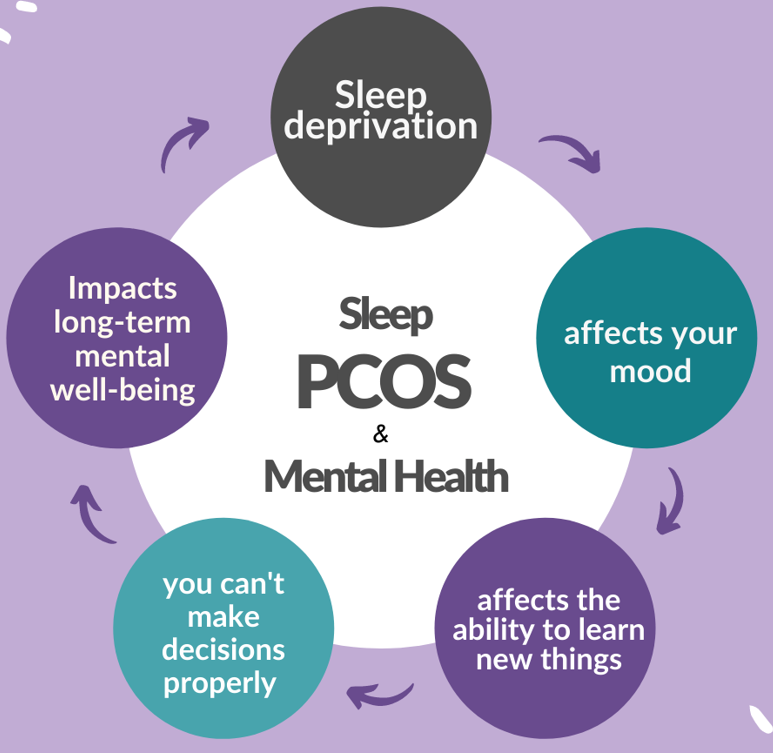
Source: PCOS Awareness Association
Researchers have explored whether variations in hormone levels in individuals with PCOS contribute to the heightened risk of anxiety and depression. In some cases, individuals with PCOS exhibit insulin resistance, leading to elevated insulin levels in the bloodstream. One study indicated that increased insulin resistance was associated with a greater risk of depression, though conflicting findings emerged in other studies. Another study suggested a correlation between higher insulin resistance and elevated anxiety symptoms, but further research is essential.
Androgens, a group of hormones including testosterone, are often elevated in individuals with PCOS. However, only one study has investigated testosterone levels, finding no significant impact on depression and anxiety symptoms. There is limited evidence suggesting that higher levels of DHEAS, a type of androgen hormone, may be linked to an increased risk of depression and anxiety in individuals with PCOS, but additional research is required to substantiate this finding.
Individuals with PCOS experiencing anxiety or depression might exhibit reduced levels of specific neurotransmitters, which are chemicals responsible for transmitting signals throughout the brain and nervous system. Serotonin, a neurotransmitter associated with positive feelings, is particularly relevant to depression and anxiety. A study indicated that individuals with PCOS with diminished levels of serotonin and other neurotransmitters reported more pronounced symptoms of depression and anxiety.
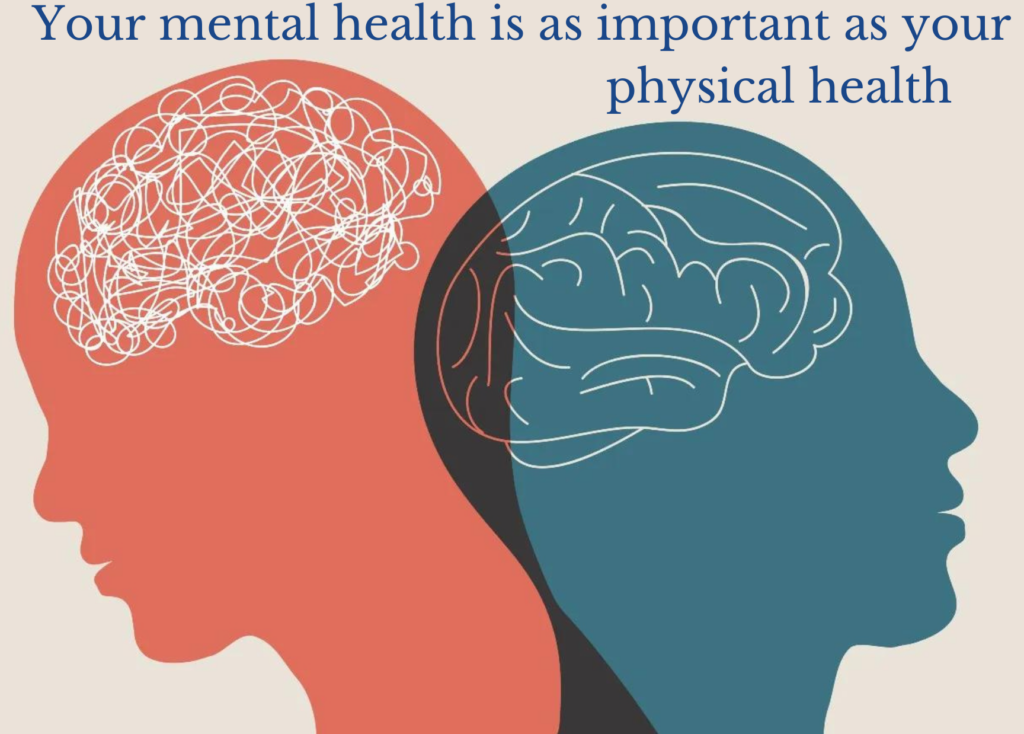
Source: The Hill
Research has explored the impact of diet and exercise on symptoms of depression and anxiety in individuals with PCOS. Combining low-calorie diets with exercise does not seem to enhance symptoms of anxiety and may only provide short-term improvements in depression.
Adopting an overall active lifestyle may contribute to better mental health. Individuals with PCOS who engaged in regular exercise reported fewer symptoms of anxiety and depression. Moreover, those who participated in at least 150 minutes of moderate exercise per week were found to have a lower likelihood of experiencing depression.
There is currently a lack of specific studies on the use of antidepressants or anti-anxiety medications tailored for individuals with PCOS. However, these medications may be prescribed in a manner similar to individuals without PCOS. Some medications, such as metformin, which assists the body in utilizing insulin, have shown potential in improving symptoms of depression and anxiety in individuals with PCOS. Additionally, metformin may have a positive impact on anxiety symptoms.
The consumption of omega-3 fatty acids from fish oil, either alone or in conjunction with Vitamin D, has been suggested as a potential strategy to reduce symptoms of depression and anxiety in individuals with PCOS.
Mood swings, struggles with getting out of bed, challenges in sustaining social connections, and a deficiency in self-care are all factors involved in the intersection of PCOS and depression. Nevertheless, PCOS can also contribute to various other mental health challenges such as the ones mentioned in the picture below. Mental and physical health are interlinked, and it’s important to understand that even if your periods are normal, you can still have PCOS and be at an increased risk for these and other mental health issues.
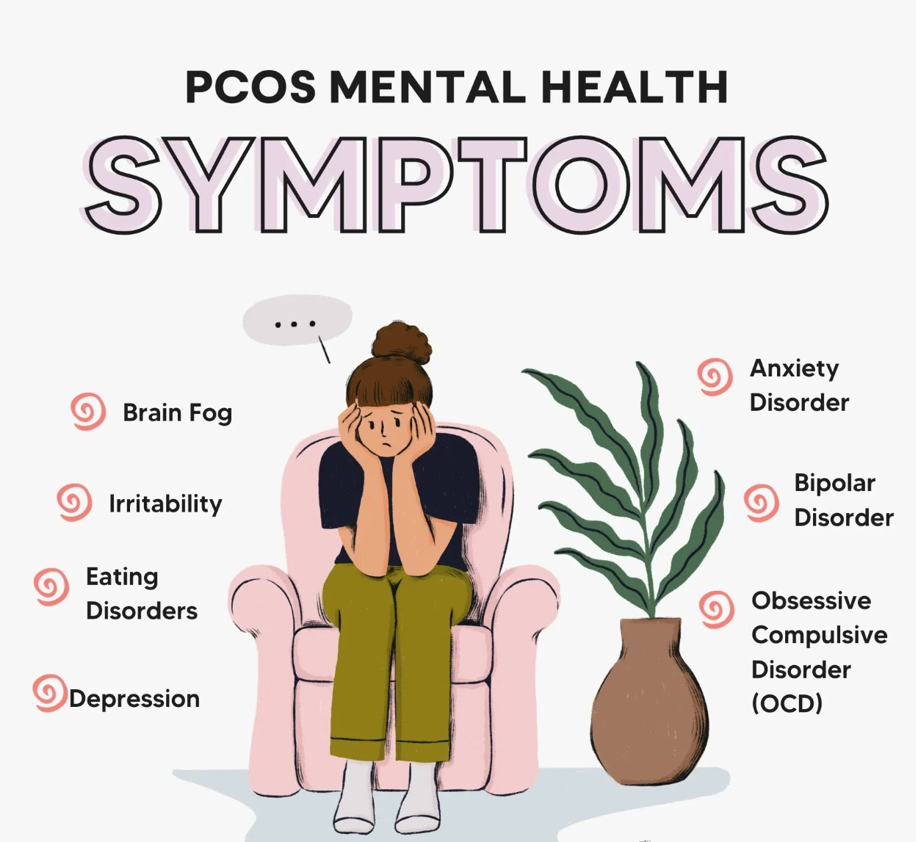
Source: pcosweightloss.org
Mental health challenges arising from PCOS can be addressed through two primary avenues: addressing the underlying PCOS and treating the mental health symptoms directly. A commonly prescribed medication for PCOS is metformin, which aids in stabilizing blood sugar and insulin levels, facilitating weight loss and restoring hormonal balance. Adopting a healthy, low-sugar diet and engaging in regular exercise have also shown positive effects in managing PCOS. Some individuals with PCOS find relief through the use of birth control to regulate menstrual cycles and address symptoms like acne, mood swings, and excessive hair growth.
Addressing mental health issues typically involves a comprehensive approach. Cognitive behavioral therapy can be effective in managing both PCOS and anxiety, while talk therapy is beneficial for individuals dealing with PCOS-related depression or general self-esteem concerns. Keeping a journal to track feelings and identify patterns, along with practicing self-care and stress reduction through activities like meditation, massage, essential oil baths, or other calming methods, can contribute to overall well-being.
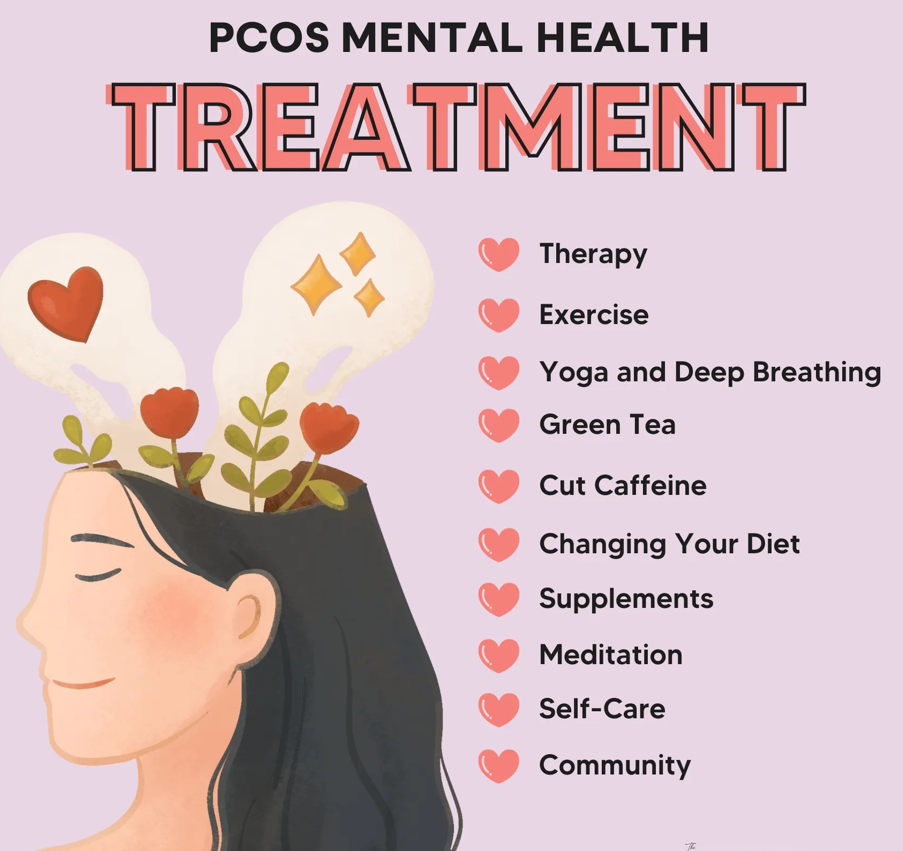
Source: pcosweightloss.org
Prioritizing both your physical and mental well-being is crucial, and you don’t have to navigate it solo. Initiating the treatment of PCOS alongside depression, anxiety, or any other mental health concern begins with a conversation with your healthcare provider. If any of the following symptoms significantly affect your daily life or cause frequent and persistent distress, it’s advisable to seek guidance from a healthcare professional:
- A feeling of dread or doom when you wake up and are faced with tackling the day
- Excessive sleeping or napping
- Difficulty falling or staying asleep
- Persistent negative thoughts about yourself
- Difficult enjoying personal relationships
- Avoiding hobbies or activities you used to enjoy
- Experiencing generalized anxiety
- Panic attacks
- Paranoia
- Suicidal thoughts or actions

Source: Pollie Team
The link between PCOS and depression and other mental health issues is real, and if you’ve been dealing with these things, you’re not alone. It’s easy to think that the symptoms you’re having are caused by the usual hustle and bustle of life, but there may be treatments that can help you feel more like your normal self and get back to your usual daily activities. If you aren’t sure whether you have PCOS or whether it could be affecting your mental health, talk to your health care provider about your symptoms and possible treatment options.
Physicians specializing in PCOS or fertility can offer valuable assistance in managing your symptoms. If unsure, consulting your general practitioner can provide insights on the appropriate professional to seek advice. You may find it helpful to work with the following:
- Endocrinologist
- Obstetrician/gynecologist
- Fertility specialist/reproductive endocrinologist
- Registered dietitian/nutritionist
- Psychologist/psychiatrist
Enhancing your psychological well-being and quality of life can be achieved through a mental health program crafted by a multidisciplinary team.5 Seek recommendations from your physician or PCOS care team for a suitable mental health program or specialist that aligns with your needs.
Navigating this condition by yourself is challenging and sometimes you just need someone who can understand what you’re dealing with and support you in your hard times. If you’re not comfortable reaching out to your healthcare provider for your emotional health, you can seek support from your friends, family or a community of women that can relate to what you’re going through. There are numerous organizations that have started support groups for women with PCOS that you can join on social media. Some of them are mentioned below:
In order to manage PCOS and understand about the patterns specific to you, tracking all the parameters discussed above like your period dates, flow, mood swings, sleep and skin condition is extremely important. This not only helps you become more aware about your body but might also be helpful information for your healthcare provider in case you need any medical help while dealing with your PCOS. Keeping a note of this is as easy as a click of a button with some readily available period tracking apps that help you track all the important details related to your periods and helps you learn more about your cycle. You can check out some of the most popular apps listed below:
Source: Shape.com


